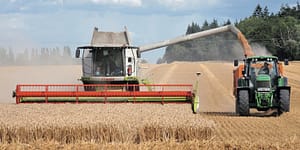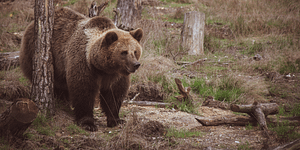Lessons From a Small Country

People say good things sometimes come in small packages, and the little country of Whales is an example of just that. As Minister for Environment, Sustainability and Housing in Wales, Jane Davidson proposed the Well-being of Future Generations (Wales) Act 2015—the first piece of legislation on Earth to place regenerative and sustainable practice at the heart of government.
If the world can follow in Whales’ footsteps, the future looks bright for the next generation.
The following is an excerpt from #futuregen by Jane Davidson. It has been adapted for the web.
The story of Wales is a story of ambition. In 1999 this small country sought a new opportunity, through its new legislature, the National Assembly for Wales, to reframe the traditional role of government by creating a new context in which to inspire better decisions in the interests of current and future generations.
I am strongly of the belief that there are particular opportunities for a small country to be a test bed; to be smarter and more flexible than its larger neighbours. Here cultural behaviour-change experiments can be piloted and new approaches forged.

Many people who come to Wales for the first time are surprised to hear that a fifth of people in Wales speak Welsh as their first language as they go about their daily activities.
Nearly a third of school pupils receive all or most of their education in Welsh. I live in one of the many places in Wales where all services are naturally delivered in Welsh by Welsh speakers. This makes it a very different environment to other parts of the U.K. and is worthy of celebration.
The National Eisteddfod of Wales, which dates back to Cardigan Castle in 1176, is not only the annual celebration of Welsh language and culture and the largest celebration of minority-language culture in Europe but is also the largest poetry and music festival in Europe, recognised globally by its ancient Red Dragon flag that is proudly outside the Union Jack.
Its young person equivalent, the Urdd National Eisteddfod – the annual Welsh-language youth festival of literature, music and the performing arts – is also Europe’s largest youth festival. I will come back later to the important part Welsh language and culture play in the Well-being of Future Generations Act.
Wales is both a nation with an ancient parliamentary history going back to 1404 and a modern vibrant country with world-class universities and fantastic natural resources – its coasts and its mountains bring tourists from all over the world. Many people who come to university here never leave because of the quality of the natural environment.
Adjacent to its second city, Swansea, lies the Gower Peninsula, the first designated Area of Outstanding Natural Beauty in the U.K. The Gower’s beaches have regularly featured among the best in the U.K., as have those in the county I live in, Pembrokeshire, and the Llŷn Peninsula and the island of Anglesey in North Wales. Snowdonia, the mountainous region in the north, is famed for hosting the second highest mountain in the U.K. and the world’s steepest road.
But Wales’ beauty and its modern, outward-looking approach bely a darker legacy.
Wales is often recognised as the first industrial country, whose considerable wealth and health was extracted from it for the benefit of people elsewhere. Wales has often led innovation. The 1841 census showed it to be the first country in history to move from agriculture to industry; the first £1 million cheque ever was signed here, in the Cardiff Coal Exchange.
Its industrial development, while kick-starting the industrial revolution, was based primarily on coal, iron, copper and steel and came at an appalling cost to both its environment and the health and well-being of its people. Quarrying was the other key industry that fuelled the revolution, with stone used for buildings and roads.
Records and pictures from the 19th century are accounts of hell, where the work was impossibly hard, conducted in atmospheres of belching smoke, dangerous blasting, poisonous fumes or the unstable dark of the mines. As we leave the old industries behind, there is a danger that we also leave behind the current and future generations of the thousands of families who contributed to Wales’ industrial strength.
With this industrial heritage, Wales unsurprisingly has a very poor health record, with life expectancies varying by five years. Inequalities in health are most pronounced in areas that also experienced social and economic deprivation, such as South Wales’ former mining valleys.
Wales has a small population – fewer than 4 million – with substantial cultural diversity in the towns and cities with docks, where different communities have integrated well for over a century. The Labour Party has been the dominant political force in Wales for more than a century. Social justice and tackling poverty remain key political themes, as does a wider equality agenda including ethnicity and gender.
There is a pervading feeling in communities ‘left behind’ by the move away from coal and steel – and with some justification – that they did all the work and did not receive the benefit. If any country needs to look after the health and well-being of future generations, it is Wales!
But how resilient is it as a nation? According to Professor Herbert Girardet of the World Future Council, the South Wales valleys are surrounded by hills rich in wind-, solar- and hydro-power potential. Surprisingly, he says, very little of this has so far been developed – and hardly any to the benefit of local communities:

Not surprisingly, in the Valleys there has been strong resistance against new wind power development.
Why should the intrusion of large wind farms into the local countryside be tolerated if it has few tangible benefits to local people?
But whilst large-scale wind, hydro and solar energy development cannot replace the 100,000 former coal and steel industry jobs in the Valleys, it could, nevertheless, spawn many new businesses and job opportunities, and a huge revenue stream for local communities.
For years the notion of getting on in Wales was to get out – and indeed the 20th century saw Welsh emigration across the world. In this century, however, there are signs of people wanting to come back to Wales, citing quality of life, distinctiveness, the Welsh language and increasingly the fact that Wales now has its own legislature.
Excitingly, the Well-being of Future Generations (Wales) Act itself is becoming a tool of Wales’ ‘soft power’ in the world, where its very existence tells you about the characteristics of a nation open to change and prepared to be responsible for future generations.
We live in interesting times. We might be the poorest country in the U.K., but we are innovators: at the forefront of genetic and Alzheimer’s disease research, but also the world’s first Fairtrade nation, a world leader in recycling, a U.K. leader in organ donation, one of the only countries in the world where ‘you can walk the shape of a nation’ along our coast and of course the first country in the world to legislate for future generations.
In so many ways, it would be easy to suggest that we live in very dark times: when drawbridges are being pulled up across the world; when those fleeing persecution, famine, disease or flood are turned back at borders, sometimes losing their lives in the process.
But there is hope – hope from individuals, from movements, from science, from politics. One of my favourite calls to action is often attributed to Margaret Mead, the anthropologist: ‘Never doubt that a small group of thoughtful, committed citizens can change the world; indeed, it is the only thing that ever has.’
We have been and are being transformative, we have been and are used to big ambition; but making this huge commitment to living more sustainably for the benefit of current and future generations – how exciting and groundbreaking is that? If lessons from the small country of Wales can help keep the intergenerational beacon alight, my job will have been well done.
Recommended Reads
Recent Articles
Why is modern wheat making us sick? That’s the question posed by author Eli Rogosa in Restoring Heritage Grains. Wheat is the most widely grown crop on our planet, yet industrial breeders have transformed this ancient staff of life into a commodity of yield and profit—witness the increase in gluten intolerance and ‘wheat belly’. Modern…
Read MoreAddressing the pressing issues affecting everyday Americans is essential—and one of our nation’s most profound challenges is the devastating impact of mass layoffs. Layoffs upend people’s lives, cause enormous stress, and lead to debilitating personal debt. The societal harm caused by mass layoffs has been known for decades. Yet, we do little to stop them.…
Read MoreWhat does facing the beast mean? In this time of uncertainty, we must practice regular reflection to achieve optimal happiness and health. The metaphor below gives insight into confronting and facing it, regardless of what “the beast” is to you. The following is. an excerpt from Facing the Beast by Naomi Wolf. It has been adapted for the…
Read MoreWe’ve all heard of the phrases “time flies” and “time heals all wounds,” but what really is time, and how does it impact our lives? The concept of time may be even more powerful than we think, especially when it comes to the money we save and spend. The following is an excerpt from The…
Read More“Climate change asks us questions that climate science cannot answer,” — Dougald Hine When it comes to climate change, it seems as if there are always new questions arising: How did we get to this point? How can we stop it? What’s next? Unfortunately, there is no black-and-white, straightforward answer to any of them —…
Read More








